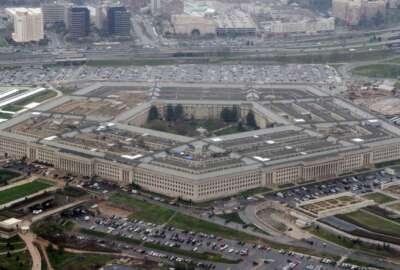

The National Security Commission on AI recommends creating a Digital Service Academy that would “grow tech talent with the same seriousness of purpose that we...
Artificial intelligence tools will soon become the “weapons of first resort,” and will accelerate the damage caused by cyber attacks and disinformation campaigns, former Deputy Defense Secretary Robert Work said Monday.
To stay top of this emerging threat, Work, speaking as the vice-chairman of the National Security Commission on AI, is calling on the federal government to add senior AI advisors to the top ranks of the White House, Defense Department and intelligence community.
The commission, in its final report to Congress and President Joe Biden, recommended standing up a Technology Competitiveness Council within the White House, modeled after the National Security Council, that would prepare for the threats and opportunities of AI.
The report also recommended creating a Digital Service Academy, modeled after the five current military service academies, that would “grow tech talent with the same seriousness of purpose that we grow military officers,” and train current and future federal employees.
Despite the breadth of the 750-page final report, Work said the commission has received “extraordinary support” from Congress, which authorized the panel in the 2019 National Defense Authorization Act.
Several of the commission’s recommendations made it into this year’s NDAA, and Work said commissioners will urge Congress and the president to put more of its recommendations on the pathway to becoming law.
“This isn’t a time for incremental steps. We have to take bold action, and any time you take bold action, conservative elements of the government want to say, ‘Let’s take a look at this more.’ We feel as a commission that this is not the time for paralysis by analysis,” Work said.
The federal government would cover tuition for students enrolled in the Digital Service Academy, in exchange for a five-year commitment to civilian federal government service after graduating.
Students would take on work as GS-7 employees after graduating and advance to GS-11 positions over the course of their five-year stints.
Students would also begin the security clearance process at least two years before graduating.
Work said Congress has taken a particular interest in the commission’s recommendation to stand up the academy, which on paper would enroll its first class of about 500 students three-to-five years after Congress authorizes it.
“That is something we could do right away,” Work said. “It will take maybe a year to stand up, but that will help us get AI-ready by 2025.”
NSCAI Chairman and former Google CEO Eric Schmidt said building up leadership and the workforce make up two of the four pillars in the commission’s final report.
The other two focus on hardening the U.S. supply chain of semiconductors and increasing the amount of federal spending on AI research and development
“We have a huge talent deficit. We need to build to talent, new talent and expand existing programs in government, and we need the world’s best to come and stay to cultivate homegrown talent,” Schmidt said.
Commissioner José-Marie Griffiths, president of Dakota State University, said the commission at one point considered meeting the goals of the Digital Service Academy through a network of existing academic institutions.
However, commissioners determined this proposal would’ve overlapped with what the Cybersecurity and Infrastructure Security Agency’s Cyber Corps Scholarship already accomplishes.
“The main reason why we went forward with a recommendation for a single new entity and university was the leadership culture that could be developed within a single institution,” Griffiths said. “If you develop things through a network, you don’t quite get that cultural component, and we feel that the federal government increasingly needs a new leadership corps, if you like, coming through and, and being constantly replenished, so that the government can continue to evolve its capabilities and technology in an unending way.”
The report notes that civil servants play a “critical and often underappreciated role in government,” but hold much of the government’s long-term expertise.
Competitive service and scholarship for service programs have helped recruit talent, but the commissioners said those programs won’t meet the full scope of the government’s demand of AI talent.
“Digitally talented people should be able to reasonably expect to spend a career performing meaningful work focused on their field of expertise in government,” the report states. “Without such an expectation, they are unlikely to join the government workforce, and without their experience matching expectations, they are unlikely to stay for long.”
The final report divides its recommendations into two buckets — how the federal government can responsibly use AI for defense and national security, and how the U.S. should prepare for a long-term competition to stay ahead of international competitors in AI research.
Work said the final report sets a high bar for agencies to improve their AI talent pool and would build up DoD’s Joint AI Center as an “AI accelerator” throughout the department.
The commission’s final report also recommends DoD and the intelligence community reach a baseline level of AI readiness by 2025.
Commissioner Safra Catz, Oracle’s chief executive officer, said DoD and the intelligence community will require a “significant change” in organizational structure, as well as increased collaboration between the intelligence and defense communities.
Steve Chien, a senior research scientist for AI and autonomous systems at NASA’s Jet Propulsion Laboratory, said the recommendations will require the federal government to “fundamentally change how it is doing business to embrace AI,” and will require participation from the private sector.
“We need academia, we need industry, we need traditional defense contractors, we need the tech technology companies. We also need small businesses. We feel that they all play a very important role in this tremendous change that is happening in the national security area, as well as the economic security area,” Chien said.
Copyright © 2025 Federal News Network. All rights reserved. This website is not intended for users located within the European Economic Area.
Jory Heckman is a reporter at Federal News Network covering the Postal Service, Department of Veterans Affairs, IRS, big data and technology issues.
Follow @jheckmanWFED



